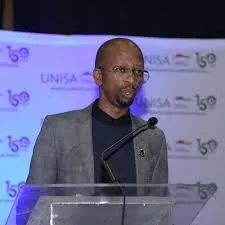Roodt still has dreams of the apartheid academic days
OPINION

Professor Boitumelo Senokoane is a professor at the University of South Africa.
Image: Supplied
History has no blank pages. Lest we forget the teaching of Hendrik Verwoerd that: “There is no place for [the Bantu] in the European community above the level of certain forms of Labour…. What is the use of teaching the Bantu child mathematics when it cannot use it in practice”.
Exactly 31 years into a democracy, Roodt still dreams of an apartheid where whites saw themselves as the chosen (theologically, racially, politically, economically) nation of South Africa, “De la Rey, De la Rey, sal jy die Boere kom lei”.
A declaration by Roodt that “most South African universities must be closed” and that only 10% should be allowed at universities is traced in the Afrikaner ideology, apartheid and a view “net vir die blankes”, an education for a few.
Apartheid was a policy of segregation and political, social, and economic against black South Africans. The current statistic suggests that there are around 7% whites in the country, and this is the basis of Roodt’s argument. In apartheid South Africa, schooling was compulsory for whites but not for Africans.
Roodt has exceptions a 3% perhaps for future expansion of the white race or he wants to have exceptions for “clever blacks” or house negros or Uncle Toms or Tengo Jabavu(s) who might be useful for the system for a whiteness project.
Before we rush to conclude and argue that at least the 1953 Bantu Education Act created an opportunity for blacks to study or to even suggest that Verwoerd did not imply exclusion of black in all education, it is important to recall that the Act was created for black South Africans and to prepare them for lives as labouring class. Roodt base his argument on skills relevancy and on performance, and of course, the preceding sentence exposes his background and that his logic is rooted in the Bantu Act.
His logic, 31 years into a democracy aims to argue the continuation of white domination through private sector education that is owned by white entities or individuals and knowingly that the lack of formal education for blacks translate into non-development of blacks, disempowerment of blacks, underpaid black workforce, and leading to the superior economic power and prosperity of whites.
The logic of private education for whites describes the chronological and continuing repetitions where schools and universities have been disproportionately used by whites to retain their social and economic benefits. This includes both the direct use of schools for their own children and the broader impact of private schools on social stratification. It is also important to note that under our economic, political, and societal reality, we might find ourselves with:
- Private universities are whiter than the inclusive university-age populace in most instances.
- Black students are underrepresented in private universities.
- Private universities are more likely than public universities to be virtually “all-white”, because of affordability.
In our country, it is a reality that white students are more likely to attend private schools and universities because the country’s white families have higher incomes than black families, on average. It is common knowledge and a common business principle that private schools and universities in the main want to aid as many students as possible, but they can only serve those who can pay.
School and university choice levels the playing field by aiding those with lower incomes to have access to the choices that others now have and even take for granted. It is not a disgrace that those who can access better schools choose to do so; it is a disgrace that, because of the public universities’ monopoly, only some can access better universities.
Roodt is advancing a dangerous agenda of black exclusion without using the correct words. He must be brave and say it, “net vir die blankes”.
Professor Boitumelo Senokoane is a professor at the University of South Africa. He writes in his capacity.